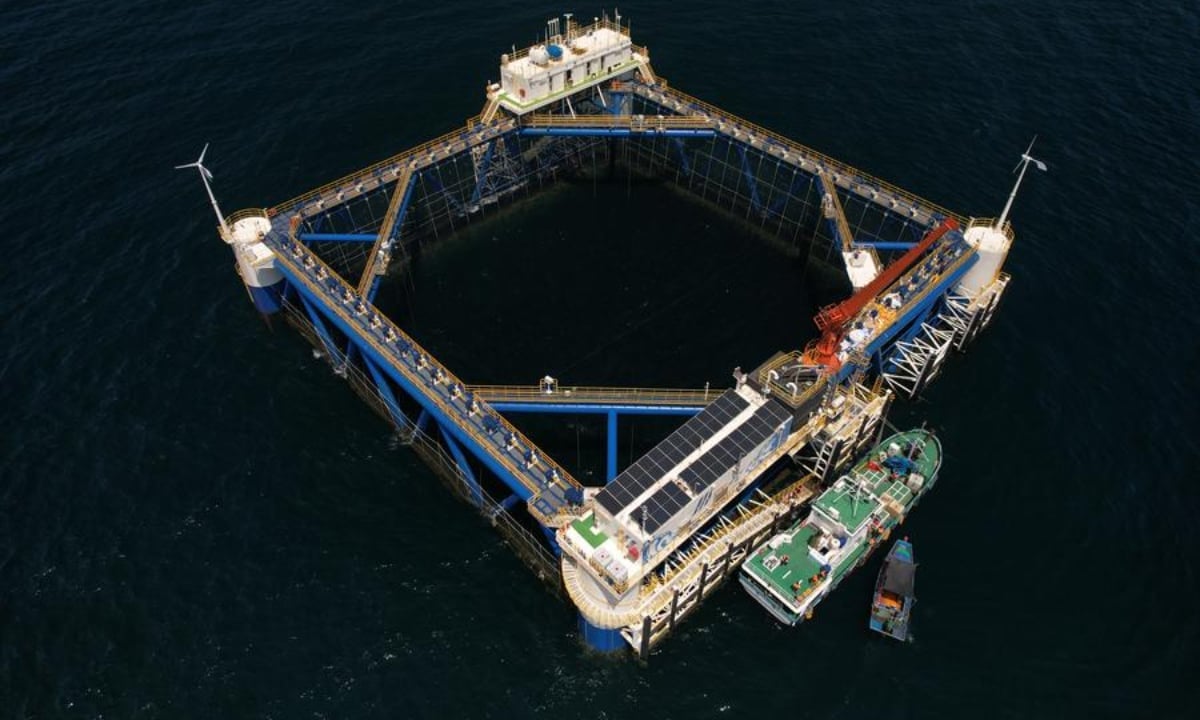November 26, 2025 | 01:08 GMT +7
November 26, 2025 | 01:08 GMT +7
Hotline: 0913.378.918
November 26, 2025 | 01:08 GMT +7
Hotline: 0913.378.918

This file photo shows a marine ranch with eight giant aquaculture cages located 42 nautical miles off the coast of Yantai in east China's Shandong Province.
The construction of marine ranches, dubbed "blue granaries" in the vast blue ocean, highlights the nation's efforts to diversify food supplies. With more investment and innovative technologies, China's marine ranching industry is playing a role in strengthening food security.
FOOD SECURITY
Chinese leaders have underscored the importance of utilizing both land and sea resources to enhance food production to feed a population of over 1.4 billion.
This year's "No. 1 central document" stresses that work must be done to build a diversified food supply system and adopt an all-encompassing approach to agriculture and food.
It says that efforts will be made to expand food resources through multiple channels, including promoting the high-quality development of fisheries and supporting the development of deep-sea and far-sea aquaculture and the construction of marine ranches.
In recent years, marine ranching has gained momentum along China's coast. In 2024, the city of Shanwei, in the southern province of Guangdong, invested more than 2 billion yuan (about 279 million U.S. dollars) to build eight marine ranches as well as cold chain and sales facilities.
To date, China has built more than 180 national-level marine ranches. The eastern province of Shandong ranked top with 71 national-level marine ranches, accounting for 38 percent of the country's total, said Zhang Jiandong, head of the Oceanic Administration of Shandong Province.
SMART AQUACULTURE
The technological advances, including automated feeding and underwater imaging systems, have transformed the aquaculture industry.As the spring aquatic farming season started recently, Liu Yulei started his work on a marine ranch with eight giant aquaculture cages located 42 nautical miles off the coast of Yantai.
Each cage, 68 meters long and wide, could enclose 94,000 cubic meters of seawater, providing an optimal environment for 1 million fish with an annual fish catch of 1,000 tonnes.
"The fish farm is built here with Class I water quality and suitable temperature and salinity," Liu said. "With strong currents moving at 1.5 meters per second, the water in the cage could be completely refreshed within dozens of seconds, much more frequently than in traditional aquaculture facilities.
"Modern technology has made fish farming more efficient. "Work on the marine ranch is busy but far easier than traditional fish farming. Only four workers can oversee a cage," Liu added.
Each giant cage is equipped with advanced sonar, lidar and binocular vision systems that allow workers to monitor the fish population, distribution and health, equipment, water quality, hydrology, and meteorological conditions in real time.
"We used to lack proper feeding knowledge, which led to excessive food waste accumulating on the seabed. Now, with scientific breeding, we have significantly improved both quality and output while also protecting the marine environment," said Luan Jianguo from another marine ranch off Changdao Island of Yantai.
A local fishing company purchases juvenile fish of certain sizes from local seafood farmers. The partnership means a faster return on investment, lower financial risks, and a larger seafood production with better quality.
NEW OPPORTUNITIES
Marine ranching also creates new business opportunities as some ranches offer travel services to tap into the consumer market better.
Off the coast of Yantai's Laishan District, the "Genghai No. 1" ecological marine ranch complex integrates aquaculture and tourism facilities to generate additional revenues.
On weekends, tourists visit the complex for an immersive marine experience. On the main deck, visitors can engage in interactive activities such as a "deep-sea elevator" simulation using VR and AR devices. They can also participate in recreational fishing and enjoy the sea view."
We provide 71 sea-view hotel rooms, and guests can also enjoy freshly caught seafood at our canteen," said Yan Haidong, deputy general manager of Shandong Ocean Harvest Corporation, which operates the complex.
Low carbon is also at the core of the complex's operation. "Our total installed solar and wind power capacity is 426 kW, with power generation of approximately 500,000 kWh annually," Yan added.
Global Times

(VAN) Deputy Minister Nguyen Quoc Tri emphasized the determination to prevent violations at CoP20, sharing enforcement results and commitments to strengthen cooperation with the international community in the coming period.

(VAN) In addition to strengthening the relationship between schools and enterprises, the Aus4Skills project expands opportunities for female students and people with disabilities to work in the transport and logistics sector.

(VAN) Nghe An is preparing policy, technical, and resource steps to participate in the forest carbon credit market.
/2025/11/25/1648-2-110733_532.jpg)
(VAN) From 2011 to 2023, Ca Mau province lost approximately 6,200 ha of coastal land and protection forests due to erosion, threatening many residential areas, infrastructure facilities, and production zones.

(VAN) Quang Ngai holds strong potential for carbon credits but needs a clear legal and policy framework to secure sustainable revenue from this resource.

(VAN) With its diverse ecosystem, Phu Quoc National Park plays a vital role in environmental protection and biodiversity conservation and serves as the core zone of the Kien Giang World Biosphere Reserve.

(VAN) Cooperation activities under the Aus4Skills program focus on: logistics professional development, competency-based training and assessment (CBTA), leadership innovation, and digitalization.